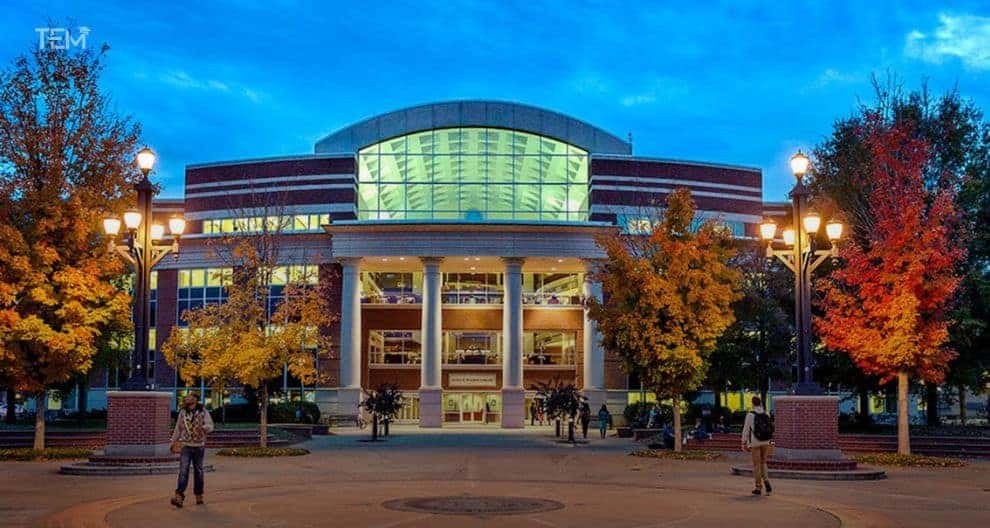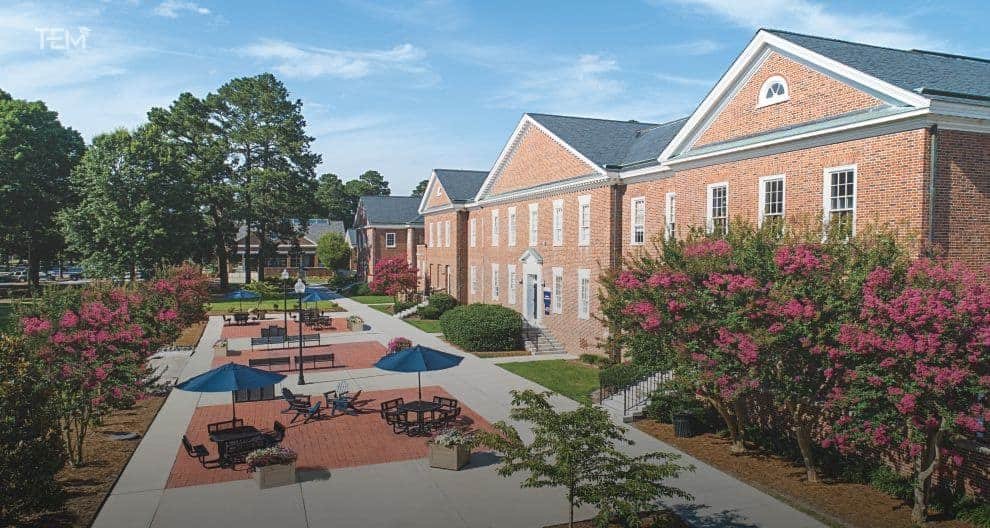Located in downtown Louisville, Kentucky, Spalding University is one of the eminent universities in the region. Founded in 1814 by the Sisters of Charity of Nazareth, it is a private university operated in the Catholic tradition with a commitment to compassion and a deep connection to the community. The Louisville campus of Spalding has been in downtown since 1920.
Throughout its history – and as the opening line of its mission statement reflects – Spalding has been “dedicated to meeting the needs of the times” through its people, programs and initiatives. It’s an institutional mission that inspires, 11th-year President Tori Murden McClure.
“Meeting the needs of the times is a finish line that we will never cross,” McClure said. “But we will strive to do our best to meet the needs of our time.”
Early in her presidency, Spalding University was certified as the “World’s First Compassionate University.” She mentions that compassion has always been a hallmark of Spalding during a century in downtown Louisville. The alumni of Spalding—nurses, psychologists, occupational therapists, social workers—are compassionate in the true spirit of the word, doing the hard work to alleviate suffering and meet the needs of the time.
A President’s journey
Tori, who prefers students to call her by her first name, holds the unique distinction as a university president who is also one of her hometown’s sporting heroes.
“It would not be inaccurate to say that I reached the Presidency of Spalding University by rowboat,” asserts Tori, who has led a life driven by the pursuit of adventure and learning.
Tori is probably best-known as the first woman and first American to row a boat unassisted across the Atlantic Ocean, a feat she accomplished in 1999 in a self-built boat called the American Pearl. Tori credits Louisvillian Muhammad Ali, who was a mentor of hers while she was on the staff to develop a museum dedicated to the boxing and humanitarian legend, for convincing her to make the trans-Atlantic journey.
Ten years before her historic row, while a graduate student in divinity school at Harvard, Tori became the first woman and first American to ski to the geographic South Pole, as part of an expedition team.
Tori, who earned a bachelor’s degree from Smith College in Massachusetts, later ran a shelter for homeless women in Louisville. Moreover, her frustrations with public policy spurred her to go to law school, which she pursued at the University of Louisville. Tori mentions that the high point of her academic studies occurred at Spalding University—where she earned a Master of Fine Arts in creative nonfiction. Spalding’s nationally-ranked MFA program helped Tori refine her memoir—A Pearl in the Storm—which balances her backcountry adventures with urban adventures and recounts her rowing of the Atlantic.
The book is the basis of the new stage musical Row, which premiered on Audible in April 2021 and will have live performances this summer at the acclaimed Williamstown Theatre Festival.
Smith College President Ruth Simmons and longtime Bryn Mawr College President Mary Patterson “Pat” McPherson convinced Tori to consider her current role at Spalding.
She was appointed the President in 2010 and has been an integral part of the growth of Spalding since then. The size of the campus has more than doubled under Tori, and new academic programs are added every year at the school that has an enrollment of about 1,700.
Academic and Support Services
According to Tori, if a university is going to admit a student and accept their tuition money, that institution has the responsibility to ensure that the student has the resources and support necessary to stay on track year over year to complete a degree. Spalding offers a range of academic and support services, including academic advising, a math lab, a writing center, a career development center, accessibility services, library services, and tech support.
Additionally, students at the university have the support of engaged and caring faculty.
“Our faculty meet students where they are, and if a student is willing to work hard and do their part, the faculty can move them a monumental distance forward in the direction of their dreams,” asserts Tori.
As Spalding offers excellent programs in clinical psychology and social work, it does not underestimate the effect of racial trauma and other factors on the mental health of its students. It also boasts a superb counseling center, staffed by leading experts.
A Plethora of Career Opportunities
Students at Spalding are exposed to a variety of experiential learning through internships and clinical, practicum and fieldwork placements. “You would be hard-pressed to find a school that does not have a Spalding graduate teaching and supporting placements for student teaching,” adds Tori. She estimated that every local hospital has clinical rotations for Spalding’s students in the health sciences, and every facility that provides mental health services depends on Spalding students or graduates.
The Doctor of Psychology (PsyD) in Clinical Psychology program has for four consecutive years matched 100 percent of its students with internships at sites accredited by the American Psychological Association—a key measure of the quality of a PsyD program. Additionally, graduate assistantships provide $450,000 per year for approximately 75 graduate students.
A Diverse Community of Learners
Spalding prides itself as a “diverse community of learners,” according to its mission statement. As the most diverse private university in Kentucky, about half of Spalding students are Pell-eligible and about half of its undergraduates are first-generation. “As a new president, I inherited an all-white leadership team. All of the deans were white and all of our Programs chairs were white. Institutional leadership did not mirror our student body,” Tori said.
However, Spalding changed its institutional portrait through conscious effort. Today, twenty-five percent of its leadership team is Black. Two of five Deans are Black, and the university has stronger diversity in the ranks of its faculty program directors. Tori mentions that while diversity at Spalding goes well beyond the number of Black leaders in particular roles, the history of this region has been hardest on African-Americans. “The bell of freedom has not rung equally for all,” she said. “It is up to us to change the reach of freedom’s bell.”
Encouraging Extra-curricular Activities
Tori prefers to think of the word extracurricular as “extra curriculum” because being involved in organized groups, teams, and activities can be hugely valuable and educational to students. Spalding is the only member of NCAA Division III in Louisville, and it sponsors nearly 20 varsity sports. Tori was a Division III athlete herself in rowing and basketball and is a huge proponent of college and amateur athletics.
Tori was proud to serve a term through January 2021 as the Vice Chair of the NCAA Board of Governors, as well as the Chair of the NCAA Division III Presidents Council. She also served as the acting Chair of the Board of Governors for a couple of meetings. “I was proud to help tiny Spalding have a seat and a voice at that enormously influential table,” she affirms.
Making Education more Attainable
Tori mentions that the United States was once at the forefront of global education; however, the country has now become too self-satisfied and self-serving to continue to claim this distinction. “While we are improving our ability to bring high-quality education to students who were not raised in privilege, we are doing a poor job of making higher education affordable to those students,” she adds.
According to Tori, among the highest obligations of an educated person in a democracy is to become an engaged citizen. Some college graduates are so crippled by debt that they cannot devote themselves to the ideals of the nation or to the well-being of their communities. Their vision and reach are impaired by crushing financial burdens. Speaking of the pandemic situation, Tori asserts, “COVID-19 and the social unrest of the past year have led many of us to rededicate ourselves to the aspirational goals of higher education and finding ways to make education more attainable. We must educate great citizens who can close the gap between the promise of our nation and the performance of our nation.”
Embracing Technology
Tori believes that education is about great faculty, willing students, and the facilities and technology that bring faculty and students together. The COVID-19 pandemic presented every college and university with opportunities to embrace technology and make the most of digital and electronic content. “At Spalding, we do not suffer from the shadow sophistication that prides itself on clean hands. Our students use their heads, and most use their hands and their hearts,” comments Tori.
Tori adds that improvements in technology do not eliminate the importance of physical presence. “A radiologist might read your X-Ray in Mumbai,
she said, “but a nurse will be standing beside your bed with the bandages and antiseptic ready.” Spalding has outstanding technology with state-of-the-art nursing simulation labs and other amenities. It just broke ground on a multimillion-dollar renovation on the new home for a soon-to-launch physical therapy program. Tori, however, mentions that education is ultimately about talented and caring faculty—spending their time and their expertise with great students.
Choosing a College
According to Tori, one of the most important factors a student should consider while choosing a college is small classes because they allow a student to have reliable access to faculty who care about their success. “Another factor is what we once called ‘fit’. Students who come to Spalding have usually experienced the pain of our world and they want to learn how to change it,” she adds. She further mentions that students should be conscious of price and should apply to a range of schools and compare the full cost of attendance, including all the little fees.

Read Full Magazine:- The 10 Most Influential Educational Leaders in USA, 2021


